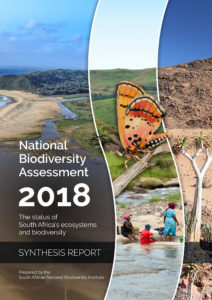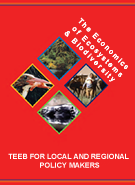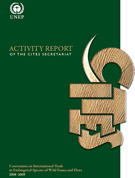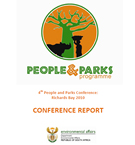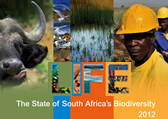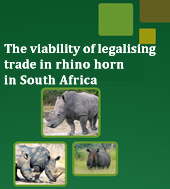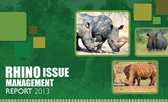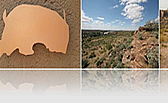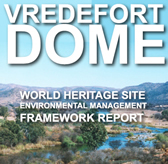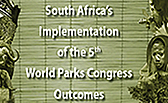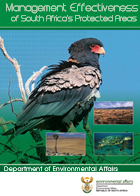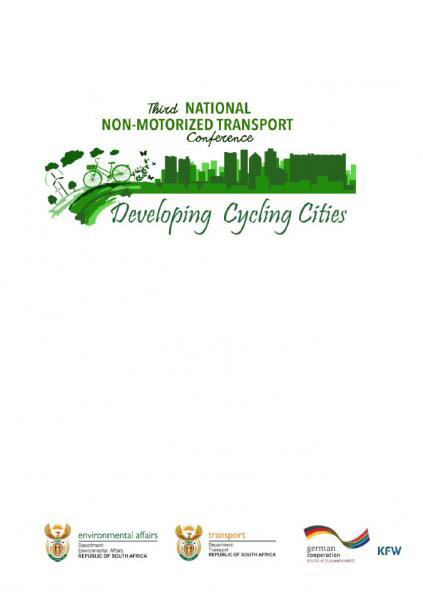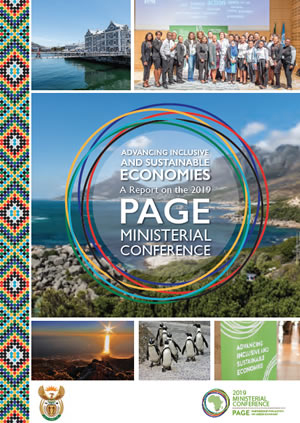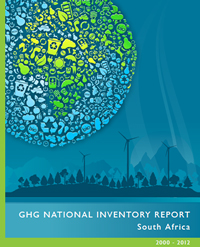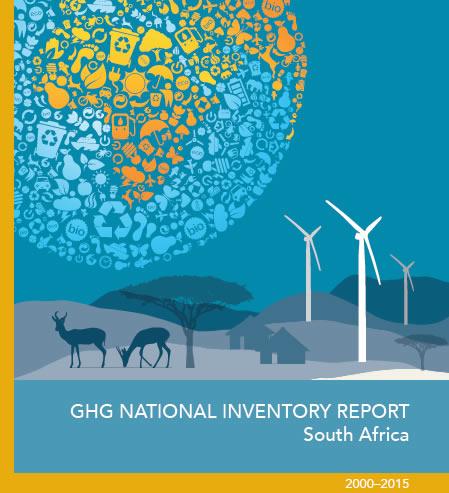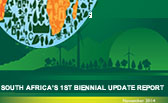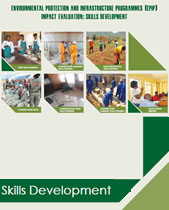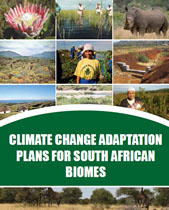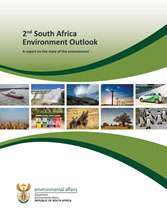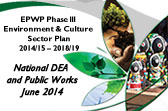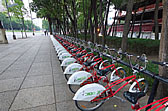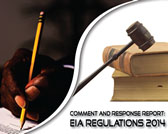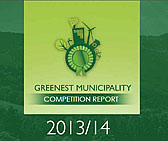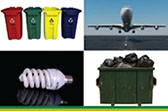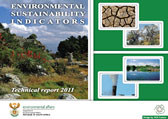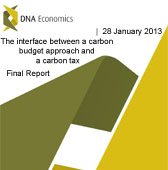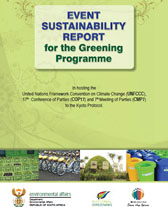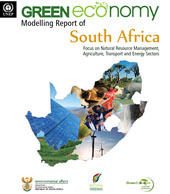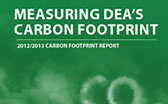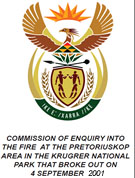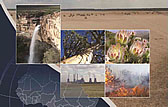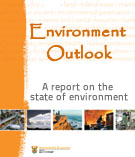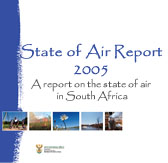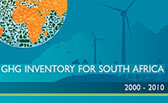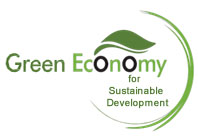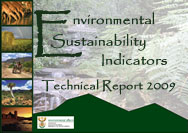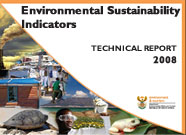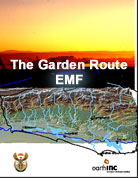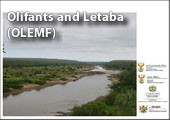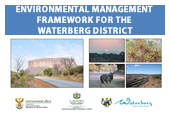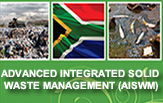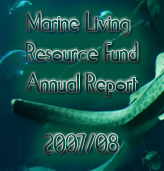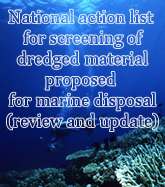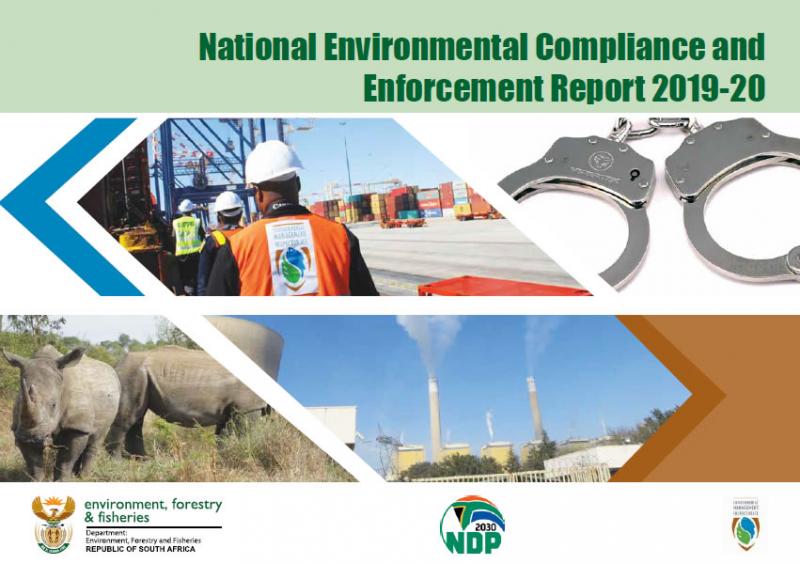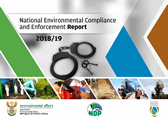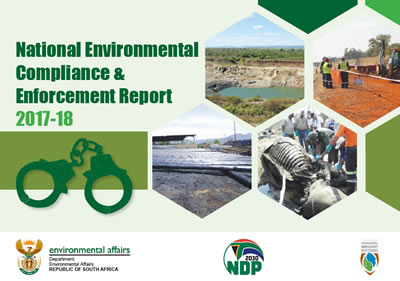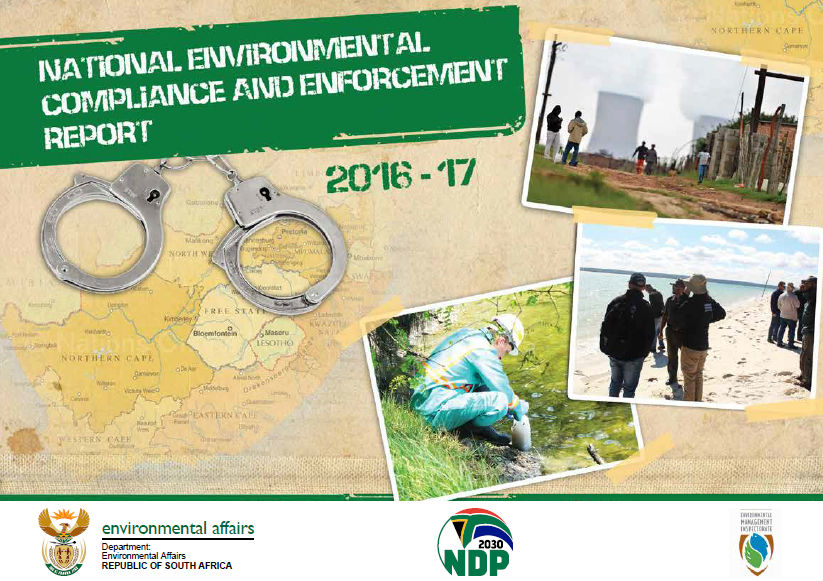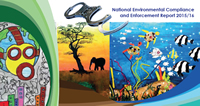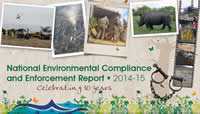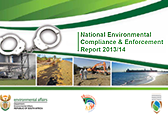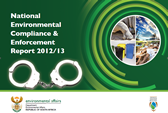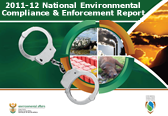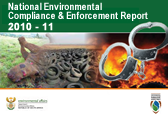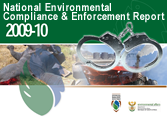Reports
Biodiversity and Conservation
2018 National Biodiversity Assessment
The National Biodiversity Assessment (NBA) is the primary tool for monitoring and reporting on the state of biodiversity in South Africa. It is used to inform policies, strategies and actions in a range of sectors for managing and conserving biodiversity more effectively. Each NBA is named after the year of the data underpinning the assessment. The third NBA, NBA 2018, was released in October 2019. The NBA 2018 has involved nearly five years' groundbreaking work from 2015 to 2019. Over 470 individuals from approximately 90 institutions have worked persistently in providing and processing data, participating in collaborative workshops, authoring chapters on technical reports, and acting as experts and reviewers for the various NBA components.
Economics of Ecosystems and Biodiversity
Executive summary [740.06 kb]
Part1: The opportunity - the value for nature for local development [1.97 mb]
Part 2:
- Chapter 2: Comceptual framework for considering the benefits of nature [337.94 kb]
- Chapter 3: Tools for evaluation and appraisal of ecosystems services in policy making [304.99 kb]
Part 3: The practice - the options for creating policies that integrate ecosystems services
- Chapter 4: Ecosystems services in CITIES and public management [843.39 kb]
- Chapter 5: Ecosystems services in rural areas and natural resources management [1.77 mb]
- Chapter 6: Spatial planning and environmental assessment [845.42 kb]
- Chapter 7: Ecosystems services and protected areas [1012.83 kb]
- Chapter 8: Payments for ecosystems services and conservation banking [918.85 kb]
- Chapter 9: Certification and labelling [531.4 kb]
Part 4: Conclusion
- Chapter 10: Making your natural capital work for local development [1.02 mb]
- Tools and database [36.85 kb]
- Glossary, abbreviations and references [135.13 kb]
Activity report of the CITES Secretariat 2008 - 2009
This document provides a framework for the future development of the existing body of Resolutions and Decisions. While it should provide guidance on how the goals and objectives are to be achieved, the Conference of the Parties, the Committees or the Secretariat as appropriate will take required action. The document also serves the Parties as a tool for the prioritization of activities, and decisions on how best to fund them, in light of the need for the rational application of costs and the efficient and transparent use of resources.
4th People and Parks Conference report - 2010
Executive summary [525.46 kb]
Introduction [287.53 kb]
South African context [909.9 kb]
International context [483.36 kb]
Community feedback [253 kb]
Thematic discussions [3.14 mb]
Site visits [243.42 kb]
Moving forward [244.4 kb]
Appendix 1: Conference delegates [239.33 kb]
Appendix 2: Minister's keynote [256.84 kb]
Appendix 3: Detailed community concerns [292.26 kb]
Life: The State of South Africa's Biodiversity report 2012
Life: the State of South Africa's Biodiversity 2012 is a summary of the National Biodiversity Assessment 2011, which was led by the South African National Biodiversity Institute (SANBI) in partnership with the Department of Environmental Affairs, CSIR, South African National Parks and a range of other organisations.
read more... [5.21 mb]
The viability of legalising trade in rhino horn in South Africa
At a Rhino Summit in October 2010, hosted by the then Minister of Water and Environmental Affairs, the Department of Environmental Affairs agreed to commission a feasibility study to determine the viability of the legalization of the trade in rhino horn in South Africa. The study had to a) analyse trends in local (national) trade in rhino horn prior to the moratorium that came into effect in February 2009…
read more... [1.76 mb]
Rhino issue management report
This report and its annexures are a compilation of information that includes recommendations for DEA to consider and better understanding of the key issues among the stakeholders regarding sustainable rhino conservation. It is presented with the hope that it will assist in developing a solid national position as South Africa prepares for the upcoming Convention on International Trade in Endangered Species of Wild Fauna and Flora (CITES) Conference of the Parties (COP) 16.
read more... [5.21 mb]
Mapungubwe Cultural Landscape World Heritage Site
This report represents the Strategic Environmental Management Plan (SEMP) of the EMF process and serves to plot the way forward for attaining the desired state. The SEMP bridges the divide between the current state of the environment in MCLWHS and the desired state....
- Mapungubwe Cultural Landscape World Heritage Site - Environmental Management Framework
- Mapungubwe Cultural Landscape World Heritage Site - Status Quo Report
- Mapungubwe Cultural Landscape World Heritage Site - Desired State Report
Vredefort Dome World Heritage Site (VDWHS)
The Vredefort Dome World Heritage Site (VDWHS) is the oldest, largest, and most deeply eroded meteorite impact structure in the world, providing critical evidence of the earth's geological history. The listing of the VDWHS in terms of the World Heritage Convention resulted in several duties and obligations being imposed on the South African government.
read more... [5.08 mb (PDF)]
South Africa's Implementation of the 5th World Parks Congress Outcomes - Preliminary Report
The report discusses the application of the internationally accepted Management Effectiveness Tracking Tool (METT), developed by the World Commission for Protected Areas (WCPA) and the World Wide Fund for Nature (WW F). It is designed as a tracking tool to identify trends over time in the management effectiveness of protected areas.
read more... [7.07 mb]
Traditional Knowledge associated with Rooibos and honeybush Species in South Africa
South Africa has a rich cultural and biological heritage and diversity, with an expansive history of linking these through the traditional use of biological resources. Local traditional knowledge (TK) of the value and use of biological resources is unique to a culture or society and is passed from generation to generation through word of mouth and cultural rituals. This traditional knowledge is usually built by a group of people living in close contact with nature...
read more... [5.08 mb (PDF)
Management Effectiveness of South Africa's Protected Areas
This report addresses goal 4.2 of the Convention on Biological Diversity's Programme of Work for protected areas. The project leading to the report was a collaborative effort, led by the Forum of Chief Executive Officers of Protected Areas, managed by the Department of Environmental Affairs and with the full participation of the following protected area management authorities
read more... [2.88 mb]
Sustainable Development: Green Economy / Climate Change / Air Quality / SEAs / EIAs
The third Non-Motorised Transport Conference report 2020
Developing cycling cities
The South African Government, represented by the Department of Environment Forestry and Fisheries (previously Department of Environmental Affairs) and with the National Department of Transport, and in partnership with the Federal Government of Germany, represented by KfW Development bank, hosted the 3rd National Non-Motorized Transport Conference on 05 and 06 of November 2019 at the Premier Hotel, Kempton Park. The aim of the Conference was to provide delegates with the opportunity to debate, reflect and share experiences, challenges and best practice on the policy imperatives, strategy requirements and collaborative approaches needed to promote cycling as a safe, and preferred mode of effective transport with the intention to encourage uptake towards more inclusive and efficient transport systems. This document provides a summary of the conference content as presented by the speakers and panellists, highlights key lessons and pointers and concludes with way forward recommendations.
Advancing Inclusive and Sustainable Economies - A report on the 2019 PAGE Ministerial Conference
This report Advancing Inclusive and Sustainable Economies: A Report on the 3rd PAGE Ministerial Conference was commissioned by the South African Government's Department of Environmental Affairs through Deutsche Gesellschaft für Internationale Zusammenarbeit (GIZ) acting on behalf of the German Ministry of Environment, Nature Conversation and Nuclear Safety (BMU).
Greenhouse Gas National Inventory Report, South Africa 2000 – 2012
This report has been compiled for the Department of Environmental Affairs (DEA ) in response to South Africa's obligation to report its greenhouse (GHG) emissions to international climate change bodies. The report is prepared in accordance with the United Nations Framework Convention on Climate Change (UNFCCC). This inventory was compiled by making use of the Intergovernmental Panel on Climate Change (IP CC) 2006 Excel spread sheet guidelines and the Good Practice Guidance..
South Africa's Greenhouse Gas Inventory Report 2000 - 2015
This report documents South Africa's submission of its national greenhouse gas inventory for the year 2015. It also reports on the GHG trends for the period 2000 to 2015. It is in accordance with the guidelines provided by the UNFCCC and follows the 2006 IPCC Guidelines (IPCC, 2006) and IPCC Good Practice Guidance (GPG) (IPCC, 2000; IPCC, 2003; IPCC, 2014).
South Africa's 1st Biennial Update Report
This report has been compiled for the Department of Environmental Affairs (DEA) in response South Africa's obligation to provide a Biennial Update Report (BUR) to the United Nations Framework Convention on Climate Change (UNFCCC) before the end of 2014.
read more... [9.82 mb]
EPIP Impact Evaluation: Skills Development
This report presents an evaluation of the impact of the skills development initiative within the Environmental Protection and Infrastructure Programmes (EPIP). EPIP is one of the Chief Directorates within the Environmental Programmes branch of the Department of Environmental Affairs (DEA). Its main goal is to alleviate poverty through interventions that are implemented in communities to uplift households especially those headed by women while empowering participants to participate in the mainstream economy. This is done in line with the Department's mandate to address the environmental management challenges facing the country.
read more... [2.93 mb]
Climate Change Adaptation Plans for South African Biomes
The Department of Environment Affairs is driving a national process, with participation of provincial and local government and civil society, to develop climate change adaptation action plans for South African biomes. One of the initial steps is to establish a plan for identifying and prioritising adaptation actions which apply to the broad South African landscape, the ecosystems which occur within it, the species which make up those ecosystems and their ecosystem services such as food and water supply; climate and disease regulation; crop pollination and tourism opportunities provided by the landscapes, and the various economic activities which take place in and depend on those landscapes. This has been called the 'Adaptation plan for South African Biomes'. A 'biome' is the highest level of ecosystem classification. This report covers the nine biomes that occupy most of the land area of South Africa.
read more... [2.93 mb]
2nd South Africa Environment Outlook - a report on the state of the environment
The 2nd South Africa Environment Outlook (SAEO) report provides a national 'big picture' snapshot of how South Africa is performing in terms of short- and long-term responses to changing conditions and to assess the effects of human interventions and management actions.
The report differs somewhat from its predecessors, in the sense that instead of adopting a scenarios-based approach, the thinking developed around the future environmental state has been crystallized using an 'impact mapping' tool within the trends in environmental data and socio-economic policy directions that have emerged since the advent of democracy in South Africa in 1994.
- Table of contents [144.29KB]
- Disclaimer [PDF 105 KB]
- Ministers message [296 KB]
- Acknowledgements [PDF 159 KB]
- List of tables, figures, maps, boxes [PDF 185 KB]
- Glossary [PDF 212 KB]
- List of acronyms [PDF 168 KB]
- Executive summary [PDF: 2.71 MB]
Part 1
- Chapter 1: Introduction [PDF 1.45 MB]
- Chapter 2: Sustainability in South Africa [PDF 1.16 MB]
- Chapter 3: What's affecting our environment? [PDF 1.56 MB]
- Chapter 4: Governance [PDF 767 KB]
- Chapter 5: Human settlements [PDF 1.93 MB]
Part 2
- Chapter 6: Land [PDF 2.02 MB]
- Chapter 7: Biodiversity and ecosystem health [PDF 2.33 MB]
- Chapter 8: Inland water [PDF 1.81 MB]
- Chapter 9: Oceans and coasts [PDF 1.95 MB]
- Chapter 10: Air quality [PDF 1.33 MB]
- Chapter 11: Climate change [PDF 1.81 MB]
- Chapter 12: Energy [PDF 2.01 MB]
- Chapter 13: Waste management [PDF 1.47 MB]
Part 3
Part 4
EPWP Phase III Environment & Culture Sector Plan 2014/15 – 2018/19
March 2014 marked the end of the second milestone in the implementation of the Expanded Public Works Programme (EPWP), which is government's flagship job creation programme. This programme is only one of government's many poverty alleviation programmes implemented by various public bodies and coordinated by the Department of Public Works. The Department of Environmental Affairs is responsible for the coordination of the Environment and Culture sector of the programme, which is one of the four sectors through which the EPWP is coordinated.
read more... [12.08 mb (PDF)]
The Non-Motorised Transport (NMT)
The Non-Motorised Transport (NMT) agenda seeks to promote safe, healthy, affordable,convinient, efficient and environmentally-friendly modes of transport. In South Africa, NMT is a reality as in many circumstances, it is either the only available mode of transport and or the most affordable one available. The manual is divided into the following chapters:
- Index
- Chapter 1 - Introduction
- Chapter 2 - Benefits of Cycling and Walking
- Chapter 3 - NMT-Friendly Policy and Legislation
- Chapter 4 - Developing a cycling masterplan
- Chapter 5 - Developing pedestrian masterplans
- Chapter 6 - Redesigning the NMT infrastructure
- Chapter 7 - Procuring consulting and construction services
- Chapter 8 - Monitoring and Evaluation of NMT projects
- Chapter 9 - Communication and awareness-raising
- Chapter 10 - Conclusion
- Chapter 11 - References
Comments and Response Report: 2014 EIA Regulations
The Minister of Environmental Affairs, Ms Bomo Edna Molewa, made regulations pertaining to Environmental Impact Assessments (R982 - 985 in the Government Gazette 38282), under sections 24(5) and 44 of the National Environmental Management Act, 1998 (Act No. 107 of 1998). The following document sets out the comments and responses.
download doc... [1.7 mb - XLS]
Greenest Municipality Competition (GMC)
The Cleanest Town Competition (CTC) was initiated in 2001 with a primary focus in implementing the National Waste Management Strategy. The key elements were reducing, recycling and reusing waste materials. Although the CTC was fairly successful in achieving its primary objectives, developments within the greening movement require the modifications of the concept to embody other elements which are outside the waste management category. The incorporation of the new elements is justifiable within a new name, hence the Greenest Municipality Competition (GMC).
read more... [1.55 mb]
National Greening 2010 Framework
The framework document provides an overarching roadmap and a reference for all stakeholders in the 2010 FIFA World Cup™ with regard to the successful greening of the event. It sets the tone for action in the focus areas and provides a guide for coordination and collaboration with relevant stakeholders.
read more... [1.57 mb]
Environmental Sustainability Indicators - 2011 technical report
The current report is an update of indicators contained in the 2008 report. All previous reports integrate 9 datasets into a set of 20 indicators of environmental sustainability. The purpose of these indicators is to provide information on our ability to protect our environment over the next decades. In addition, the indicators reflect key factors determining the state of the environment, and show whether we are moving towards environmental sustainability or not.
read more... [3.89 mb]
Interface between carbon budget approach and carbon tax final report
This report begins with the premise that a carbon tax will be introduced as the mainstay of South Africa's carbon mitigation effort. The purpose of this report is to then consider how QBIs can be combined with a carbon tax to support the effective and efficient achievement of DEROs. The report, thus, does not deal with the design of overall climate change mitigation policy in South Africa, but rather with a very specific subset of mitigation policy.
read more... [2.41 mb]
COP17/CMP7 Greening Programme: Event Sustainability Report
The report sets out to document and assess the COP17/CMP7 National Greening Programme that aimed, amongst others, to give effect to Article 4(1) and Article 4(2) of the Host Country Agreement signed between the UNFCCC Secretariat and the Government of South Africa.
- Cover page and table of contents [1.43 mb]
- Acronyms, acknowledgements, foreword, executive summary [843.71 kb]
- Introduction [1.50 mb]
- COP17/CMP7 sustainability approach [1.38 mb]
- Climate Change Response Expo [2.94 mb]
- Carbon emissions [888.94]
- Resource management [1.23 mb]
- Inclusive communities [1.26 mb]
- Sustainable transportation [1.26 mb]
- Marketing, communications and awareness [3.26 mb]
- Conclusion [908 kb]
- Global Reporting Initiative Index [1.71 mb]
- Appendices [4.78 mb]
The Green Economy Modelling Report of South Africa: A focus on Natural Resource Management, Agriculture, Transport and Energy sectors
This report presents the modelling process and the results represented as the South African Green Economy Modelling (SAGEM) report that was developed to test national targets and the effects of investing in a green economy in South Africa. It affirms the current government's support for a green economy.
read more... [4.49 mb]
Measuring DEA's Carbon Footprint - 2012/2013 Carbon Footprint Report
This report presents the carbon footprint of DEA in tons of carbon dioxide equivalent (CO2e) emissions for the financial year 2012/13. In the current 2012/13 carbon footprint report, 16 different emission sources (categorised under three scopes) were taken into account, calculated and verified.
read more... [2.55 mb]
Ngobeni Commission of Enquiry to the President of South Africa: Commission of Enquiry into the Fire at Pretoriuskop Area in the Kruger National Park that broke out on 4 September 2001
The Acting President, Mr. J Zuma appointed David Dlamafa Ngobeni as sole member and chairperson of the Commission of Inquiry into the Fire at the Pretoriuskop Area in the Kruger National Park that broke out on 4 September 2001. The appointment was promulgated in Government Notice R.1388 in the Government Gazette No. 22944 of 21 December 2001.
read more... [9.16 mb]
South Africa's Second National Communication under the United Nations Framework Convention on Climate Change
This document constitutes South Africa's Second National Communication (SNC), in which several substantive advances in the national understanding of climate changerelated issues are reported. The document follows suggested UNFCCC SNC guidelines for developing countries in reporting on national circumstances, and a national greenhouse gas (GHG) inventory for the year 2000.
read more... [5.39 Mb]
South Africa country report to the Fourteenth Session of the United Nations Commission on Sustainable Development
This report is the South African country report to the Commission, which reports on the progress made in the implementation of Agenda 21 with regard to the review, evaluation and monitoring processes. It specifically focuses Industrial Development, Climate Change Air Pollution / Atmosphere and Energy for Sustainable Development. The key elements of the CSD-12 Report include a reflection on lessons learnt, best practice, the identification of actions, opportunities and constraints to the implementation of sustainable development and to the formulation of the NSDS.
read more... [171.13 kb]
National Roundtable on Sustainable Consumption and Production
The National Roundtable was held within the framework of the Marrakech Process on Sustainable Consumption and Production, the process was launched in 2003 as a follow up process to the JPOI target on SCP.
read more... [235.2 kb]
Environment Outlook: A report on the state of environment of South Africa
Message by Minister, about the report, acknowledgements and synthesis [PDF - 2.31 mb]
Part I: Setting the scene [PDF - 5.77 mb]
Part II: State of the environment
- Environmental governance [PDF - 4.47 mb]
- Land [PDF - 10.03 mb]
- Biodiversity and ecosystmes health [PDF - 3.98 mb]
- Inland water [PDF - 2.76 mb]
- Marine and coastal resources [PDF - 3.84 mb]
- Atmosphere [PDF - 2.69 mb]
- Human settlements [PDF - 38.66 mb]
Part III: Human vulnerability to environmental change [PDF - 3.22 mb]
Part IV: Outlook 2005 - 2025 [PDF - 1.59 mb]
Part V: Options for action [PDF - 1.84 mb]
- Acronyms and abbreviations [PDF - 1.3 mb]
State of Air Report
Cover page [567.49 kb]
Foreword, contents and executive summary [1.02 mb]
Chapter 1: Introduction [712.94 kb]
Chapter 2: Air quality and sustainable development [1.02 mb]
Chapter 3: Air quality standards and objectives [1.04 mb]
GHG Inventory for South Africa 2000 - 2010
This report has been compiled for the Department of Environmental Affairs (DEA) in response to South Africa's obligation to report their greenhouse (GHG) emissions to international climate change bodies. The report is prepared in accordance with the United Nations Framework Convention on Climate Change (UNFCCC)...
read more... [3.2 mb]
Green Economy COP17 Side Event Report
South Africa through its Department of Environmental Affairs (DEA) and the United Nations Environment Programme (UNEP) co-hosted the side event entitled "Moving towards a Green Economy" along the fringes of Durban UNFCCC COP 17/CMP7 on 2 December 2011 at the Africa Pavilion.
read more... [457.78 kb]
Environmental Sustainability Indicators
2009 technical report
Introduction [1.18 mb]
State of environment systems [1.32 mb]
Reducing environmental stress [1.2 mb]
Reducing human vulnerability [1.09 mb]
Social and institutional capacity to cope [1.24 mb]
Global stewardship [764.04 mb]
2008 technical report
Introduction [208.8 kb]
State of environment systems [1.39 mb]
Reducing environmental stress [934 kb]
Reducing human vulnerability [470.22 kb]
Social and institutional capacity to cope [1.23 mb]
Global stewardship [1.14 mb]
Environmental Management Framework Report
EMF report for Garden Route
Status quo assessment report [17.61 mb]
Report figures [37.27 mb]
Final report [10.68 mb]
EMF report for Olifants and Letaba (OLEMF) rivers catchment areas
Status quo report
- Cover page [883.08 kb]
- Report [8.82 mb]
Public participation
- Report [4.88 mb]
Project resource documents [75.25 kb]
Ecological reserve report [1.42 mb]
Specification of activities on geographical areas [651.9 kb]
Vegetation [1.18 mb]
Eco-region maps [468.19 kb]
OLEMF final report [15.04 mb]
EMF report for Waterberg district
Framework report
- Cover page [640.56 kb]
- Inside cover [115.73 kb]
- Final report [19.7 mb]
Desired state report
- Cover page [392.17 kb]
- Inside cover [21.09 kb]
- Final report [405.44 kb]
- Appendix 1: Comments and responses submitted by stakeholders and the public round 1 and 2 [446.96 kb]
- Maps [2.5 mb]
Public participation report
- Cover page [128.34 kb]
- Final report [1001.47 kb]
Status-quo report
- Cover page [192.5 kb]
- Inside cover [21.12 kb]
- Final report [6.37 mb]
- Maps [1.98 mb]
- Appendices
- Air quality [342.03 kb]
- Fauna species [500.45 kb]
- Weather tables and rainfall [744.88 kb]
Chemicals and Waste
National Waste Management Strategy Implementation South Africa: Inception Phase
read more... [279.04 kb]
Greenhouse Gas Emissions associated with Shale Gas Report
Environmental Resources Management Southern Africa (Pty)Ltd (ERM) was commissioned to assist the Department ofEnvironmental Affairs (DEA) in understanding the potential greenhouse gas (GHG) emissions profile associated with thelife cycle of shale gas extraction, production and use. At the time of publishing, uncertainty exists with regard to the GHG emissions profile, and possible available options for the use of potential shale gas reserves in South Africa.
read more... [5.33mb]
Advanced Integrated Solid Waste Management (AISWM)
Advanced Integrated Solid Waste Management (AISWM) is the process of advancing waste management practices up the hierarchy away from landfill and towards creating energy, recycling, composting, reuse and reduction. AISWM does not necessarily demand the use of sophisticated and expensive technology; rather it involves a blend of management systems and appropriate technologies that succeed in sustainably diverting waste away from landfill. This document focuses on the financial aspects of developing and operating different types of advanced waste treatment facilities and provides an overview of the financial implications of moving away from landfill and towards AISWM systems. Benchmark cost ranges and breakdowns are included for different technologies and guidance on preparing a business case (including planning and financial analysis) for AWT systems is provided.
Appropriate Technology for Advanced Waste Treatment- Guideline
- Index - Appropriate Technology for Advanced Waste Treatment-Guideline
- Chapter 1 - Overview of this Document
- Chapter 2 - Advanced Waste Treatment Technology Concepts
- Chapter 3 - Advanced Waste Treatment Technology Options
- Chapter 4 - Promising Technologies Short Term
- Chapter 5 - Potential Technologies Medium Term
- Chapter 6 - Potential Technologies Long Term
- Chapter 7 - Conclusion
Recognising the Informal Waste Sector in Advanced Waste Treatment
Oceans and Coasts: blue economy, Operation Phakisa, marine
South Africa's National Action List for the Screening of Dredged Sediment Proposed for Marine Disposal
The national action list will need to balance the sometimes conflicting needs of dredging proponents and the need to protect the ecology of the dredging and dredged spoil disposal environments. Because of conflicting needs and economic realities, the logical approach is to revise the national action list by consulting stakeholders. This report does not, therefore, present a revised national action list, but rather provides stakeholders with information on factors that need to be considered and options for its revision.
read more... [2.1 mb]
Marine Living Resource Fund annual report 2007/08
The report indicates significant progress from previous disclaimed audit opinions and qualifications to the extent that no qualifications or emphasis of matter have been identified in this report. Not only is it indicative of vast improvements in financial and corporate governance, but it also means that the target for an unqualified audit report without emphasis of matter has been achieved two financial years ahead of schedule.
read more... [1.95 mb]
National action list for screening of dredged material proposed for marine disposal (review and update)
This report does not present a revised National Action List, but rather provides stakeholders with information on factors that need to be considered and options for its revision. An invitation to a technical workshop hosted by the branch Oceans and Coasts of the Department of Environmental Affairs in Cape Town will be extended to certain stakeholders.
read more... [2.1 mb]
South Africa's National Coastal Management Programme
This document presents South Africa's National Coastal Management Programme (NCMP) under the National Environmental Management: Integrated Coastal Management Act (Act No. 24 of 2008) (ICM Act) for the period 2013 to 2017. Coastal zones throughout the world have historically been among the most heavily exploited areas because of their rich resources.
read more... [1.91 mb]
South Africa's National Coastal Management Programme
This document presents South Africa's National Coastal Management Programme (NCMP) under the National Environmental Management: Integrated Coastal Management Act (Act No. 24 of 2008) (ICM Act) for the period 2013 to 2017. Coastal zones throughout the world have historically been among the most heavily exploited areas because of their rich resources.
read more... [1.91 mb]
Compliance and Law Enforcement
National Environmental Compliance and Enforcement Report 2019/20
The 2019/20 financial year marks the 14th year in which DEFF has collaborated with its provincial and local counterparts and statutory bodies to develop the National Environmental Compliance and Enforcement Report (NECER); a joint publication that aims to provide an overview of environmental compliance and enforcement activities undertaken by the various environmental authorities over the period of a financial year. The NECER is aimed at a broad spectrum of stakeholders, including a range of private, public and community-based institutions. In this respect, the report seeks to fulfil some of the information requirements of regulators, the regulated, the general public and other interested organisations.
read more... [11.9 mb (PDF)]
National Environmental Compliance & Enforcement Report 2018/19
The 2018/19 NECER is divided into 14 chapters. It commences with a summary of the key findings of the report, followed by a section outlining the capacity and profile of the Environmental Management Inspectorate. An overall is followed by a more detailed breakdown per institution/province. The subsequent legal chapters include recent court cases related to the environment; as well as the legislative developments that came into effect in the financial year.
read more... [11.9 mb (PDF)]
National Environmental Compliance & Enforcement Report 2017/18
The NECER is aimed at a broad spectrum of stakeholders, including a range of private, public and community-based institutions. In this respect, the report seeks to fulfil some of the information requirements of regulators, the regulated, the general public and other interested organisations.
read more... [11.9 mb (PDF)]
National Environemntal Compliance and Enforcment Report 2016/ 17
The 2016/17 financial year marks the 10th year in which DEA has collaborated with its provincial counterparts and statutory bodies to develop the National Environmental Compliance and Enforcement Report (NECER); a joint publication that aims to provide an overview of environmental compliance and enforcement activities undertaken by the various environmental authorities over the period of a financial year.
read more... [3.69 mb (PDF)]
National Environemntal Compliance and Enforcment Report 2015/ 16
The 2015/16 financial year marks the 9th year in which DEA has collaborated with its provincial counterparts and statutory bodies to develop the National Environmental Compliance and Enforcement Report (NECER); a joint publication that aims to provide an overview of environmental compliance and enforcement activities undertaken by the various environmental authorities over the period of a financial year.
read more... [7.47 mb (PDF)]
National Environemntal Compliance and Enforcment Report 2014/ 2015
The 2014/15 financial year marks the 8th year in which DEA has collaborated with its provincial counterparts and statutory bodies to develop the National Environmental Compliance and Enforcement Report (NECER); a joint publication that aims to provide an overview of environmental compliance and enforcement activities undertaken by the various environmental authorities over the period of a fi nancial year.
read more... [5.96 mb (PDF)]
National Environmental Compliance and Enforcement Report 2013/ 2014
The 2013/14 financial year marks the 7th year in which the national Department of Environmental Affairs (DEA) has collaborated with its provincial counterparts and statutory bodies to develop the National Environmental Compliance and Enforcement Report (NECER); a joint publication that aims to provide an overview of environmental compliance and enforcement activities undertaken by the various environmental authorities over the period of a financial year...
read more... [3.1 mb]
National Environmental Compliance and Enforcement Report 2012/ 2013
This report, which outlines the work and achievements of the environmental compliance and enforcement sector over the 2012/2013 period, is the sixth of its kind since the inception of the Environmental Management Inspectorate (EMI). As the EMI institutions become better at reporting the information each year, so the accuracy of the statistics in the report improve, providing us with a more comprehensive understanding of the important work being done by the environmental compliance and enforcement sector.
read more... [2.58 mb]
National Environmental Compliance and Enforcement Report 2011/ 2012
This report marks the sixth of its kind since the inception of the Environmental Management Inspectorate. It outlines the work and achievements of the environmental compliance and enforcement sector over the 2011/2012 period. The landscape of environmental legislation in South Africa has shifted dramatically in the past decade, with a major legislative review producing one of the most comprehensive regulatory environmental frameworks in the world.
read more... [1.9 mb]
National Environmental Compliance and Enforcement Report 2010/ 2011
The initiation of this report coincided with the creation of a common set of national compliance and enforcement powers through the establishment of the Environmental Management Inspectorate in 2005. However, it must be noted that the scope of this report extends beyond the work of the Inspectorate, and also includes other regulatory functions executed in terms of provincial legislation.
read more... [1.57 mb]
National Environmental Compliance and Enforcement Report 2009 / 2010
NECER report's objective is to provide a national overview of environmental compliance and enforcement activities undertaken during the period 1 April 2009 to 31 March 2010. This report reflects the work of all environmental compliance and enforcement officials operating at national and provincial levels; even though certain sections focus particularly on the Environmental Management Inspectorate.
read more... [2.03 mb]
Forestry management reports on on project and programmes undetrtaken
Woodlands and indigenous forest management
- Forestry change programme: Business process analysis report forestry transfers process. Version 5.0. [PDF - 165.95 kb]
- Developing criteria and a framework for the application of legislation on the protection of indigenous tree species: workshop proceedings and papers, 26 - 27 October 2000. [PDF - 153.61 kb]
Small scale forestry
- BBBEE Charter progress report, April 2006. [PDF - 19.5 kb]
- Forestry development workshop proceedings, 14 – 15 August 2008. [PDF - 122.12 kb]
Forestry regulation and oversight
- Report on commercial timber resources and primary round wood processing in South Africa, March 2019 [PDF - 1.44 mb]
- Progress report: protected area planing for natural forests. Social, cultural and economic considerations for natural forest protected area selection. [PDF - 198.5 kb]
- Fire Protection Association annual report for the financial year 2009/10. [PDF - 1.15 mb]
- The Knysna fires: 12 days of service. Young men and women from the Department of Environmental Affairs' Working on Fire - this is their story. [PDF - 3.64 mb]
- South Africa's National Forestry Action Programme, 1 September 1997. [PDF - 15..9 mb]
- A review on the National Forestry Action Programme. [PDF - 510.36 kb]
- Forest protected area classification: progress report, 4 July 2003. [PDF - 121.07 kb]
- Protected area planning for the forest biome. [PDF 16.46 kb]


